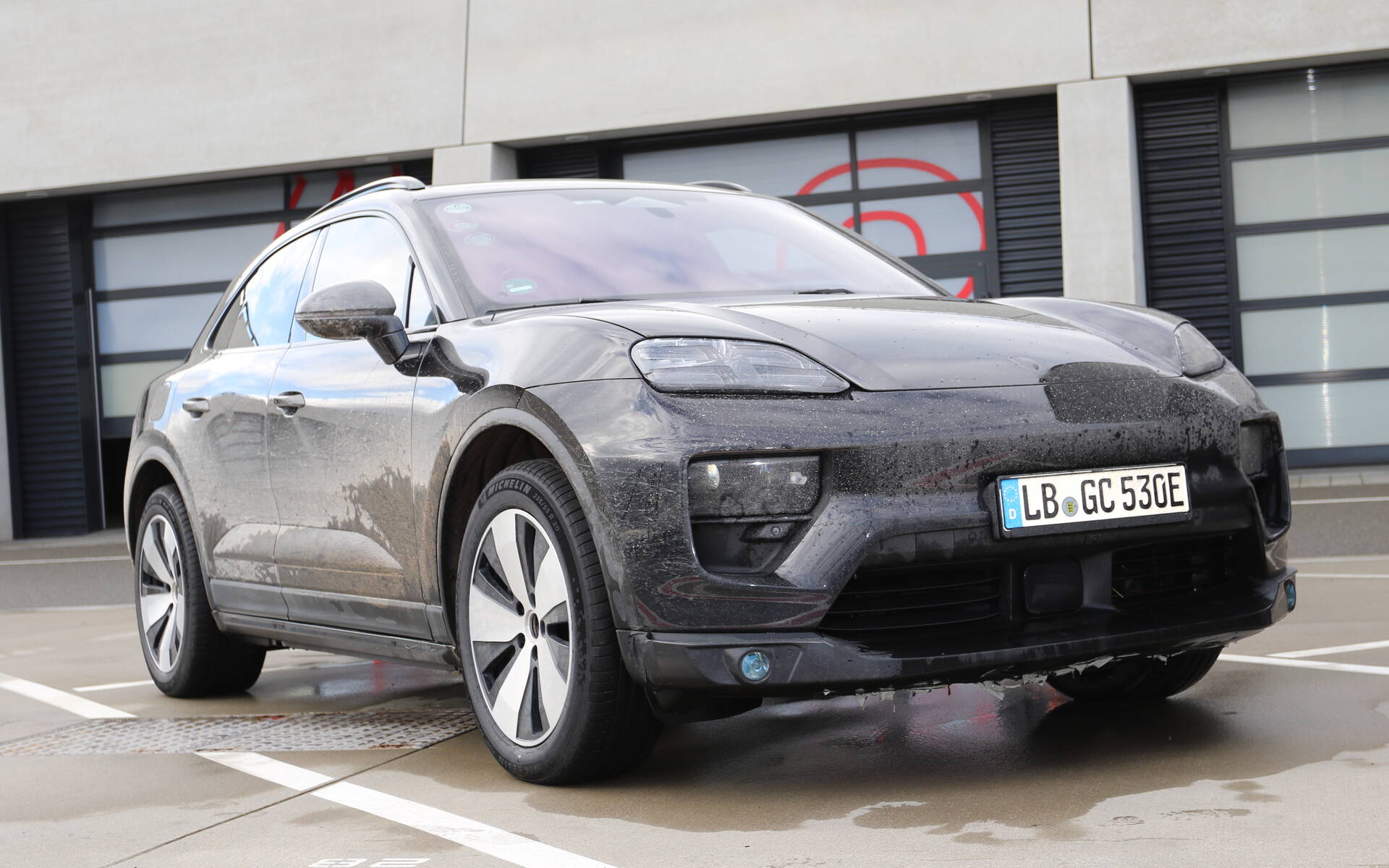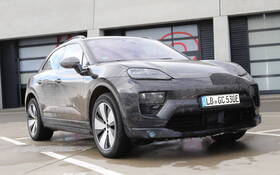We Rode Shotgun in the Upcoming Porsche Macan EV
Leipzig, Germany—Porsche invited The Car Guide to a series of lectures and workshops featuring the upcoming Macan EV. We even got to ride shotgun and see for ourselves what performance will be like with this new model.
A decade after the original Macan first rolled off the line, the German automaker is about to launch a fully electric variant. This will be Porsche’s second vehicle not housing an internal combustion engine, joining the Taycan sedan. Since the official reveal has yet to take place, the units we were allowed to inspect and sit in were still partly camouflaged, while the information we were given was missing some key specs. That being said, there’s a lot we can tell you for now.
- Also: Gas-Powered Porsche Macan Isn’t Going Away Anytime Soon
- Also: Porsche Shows Electric Macan Prototype
Let’s start with styling. The headlights are reminiscent of those on the Taycan, but obvious similarities with the conventionally powered Macan remain, especially when viewed from the sides. Unfortunately, the confidentiality agreement we signed with Porsche prevents us from showing you pictures of the interior or even describing it, due to the fact that the production design is not finalized yet.

What we can tell you is that the Macan EV is blessed with a sophisticated new infotainment system and a Taycan-style digital instrument cluster with configurable displays. The former benefits from faster-processing software and offers several new features.
Notable among them is the Porsche App, which allows users to monitor and remotely control a number of vehicle functions. Augmented-reality navigation, media apps such as YouTube and Spotify, as well as the ability to have Apple CarPlay right in front of the driver are also part of the package. Furthermore, a virtual assistant (“Hey Porsche”) is just one voice command away.
Over 600 Horsepower
The Porsche Macan EV will be available in single-motor (RWD) and dual-motor (AWD) configurations. That goes for Canada, too, which is kind of a surprise. Total system output is rated at 603 horsepower along with 738 lb-ft of torque when two motors combine together. Quite impressive for a compact SUV, although weight is still unspecified. The 100kWh battery, which is an improved version of the technology at work in the Taycan, weighs 570 kg alone.

Unlike Tesla, which relies on a large number (thousands) of small cells, Porsche chose to use 12 battery modules containing 15 large cells apiece. The engineers we talked to stayed mum about usable battery capacity, but it should be just over 90 kWh. Each module is independent from the others, meaning it can easily be replaced in case there’s a problem and a repair is required.
Thanks to Porsche’s 800V electric architecture, the Macan EV has a max charge rate of 270 kW, so four minutes at a DC fast charger should provide around 100 km of range—in ideal conditions, of course. Real-world charging may result in different numbers, which we will verify in due course.
The vehicle is built on the Premium Platform Electric (PPE) shared with other EVs of the Volkswagen Group. Weight distribution is near-perfect at 48/52. Drivers have a choice of four modes (Normal, Sport, Sport Plus and Off-Road), with ride height that can drop by as much as 30 mm and increase by up to 40 mm.

Porsche also spent a considerable amount of time working on the suspension and steering to ensure exceptional handling and agility. The rear wheels can actually turn up to 5 degrees to make parking manoeuvres easier and improve stability at higher speeds. Wheel size, by the way, ranges from 20-22 inches.
In the Front Passenger Seat
Following the speeches and technical presentation, Porsche put us in the front passenger seat of the Macan EV for some quality time on the road, a few laps around the track and a short off-road session on an obstacle-filled course.
We started with the road portion. The Porsche test driver behind the wheel activated Launch Control, hit the throttle and released the brakes, the ensuing blast pinning us to our seats in almost violent fashion. Acceleration times remain a secret for now, but based on our experience we’d say 0-100 km/h is achieved in around 3.5 seconds.
On the test track, the Macan EV showed a fantastic ability to pick up speed in a hurry. Equipped with Michelin Pilot Sport tires, it displayed excellent balance and lateral grip. Despite the wet tarmac, the test driver really had to work to send the rear end sideways. Braking performance proved similarly satisfying even though steel discs were mounted on the vehicle instead of carbon ceramic rotors.

Later, at a former soviet military base where Porsche had set up an off-road course with gravel trails, mud patches, a water crossing about 30-50 cm deep and various other obstacles, the Macan EV drove head first into a 39-degree slope, crawled across another one with a 35-degree angle, and then went back down as if none of that was a big deal. Granted, many of today’s SUVs could have done the same, but the way the suspension soaked up bumps and handled deep holes without tossing passengers around was the most impressive thing. Even at 100 km/h in the gravel, the vehicle seemed unflappable.
Too bad we didn’t get the opportunity to drive it. The Macan EV felt highly capable and nimbler than most battery-powered SUVs currently on the market, but we’ll hold our final judgement until we can sit in the driver’s seat and try it out for ourselves.
Look for an official reveal in the first quarter of 2024. The newest electric Porsche will go on sale at a later date, likely as a 2025 model.












